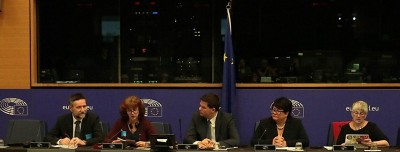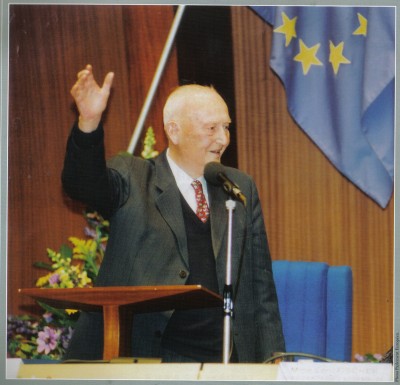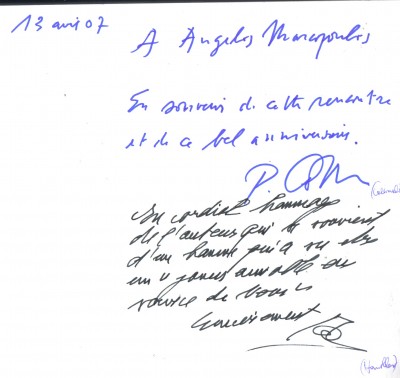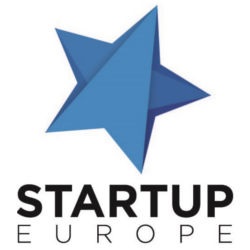Viewpoint: Notes on PanEuropa Conference "Education in the Digital era" (Jan. 2019)

***
Texte: Joanna Michel and Dominique Grandcamp.
Translations in English and German from the original in French + Photo: Patrick Bracker.
(NDLR: Viewpoints are presented as entrusted to "Eurofora" for Publication. Contents engage their Authors).
---------------------------------
The meeting of the pan-European working group of the EPP Group of the European Parliament saw a topical conference with high quality presentations, followed by a passionate and in-depth discussion with the knowledgeable participants, who asked real and relevant questions. The speakers responded brilliantly to the questions adapted during this dialogue.
These contributions will be useful in the context of the European parliamentarians' reflection on this sensitive topical issue. Thanks to the dynamism of its members, the EPP Group is at the forefront of initiative and discussion on thissocietal issue. Let us congratulate the choice of the quality of the speakers and the moderation of the debates by the Chairman of the pan-European working group: the European deputy Lukas Mandl.
Summary report by Joanna Michel and Dominique Grandcamp, groupe Bracker Patrick
Conference: “Education in the context of the digital age” 17.01.2019 EP Strasbourg
Intervenants :
Prof. Andrea Young - Faculty of education and lifelong learning university of Strasbourg
Julie Ward - Member of European Parliament’ member of the CULT committee (UK)
Pavo Barisic - Professor of Philosophy University of Zagreb, former minister for science and education of Croatia, Secretary General of the PanaEuropean union
Sabine Verheyen - Member of European Parliament member of CULT committee (EPP, Germany).
How to change education policy in EU countries, 80% of posts will have to integrate digital tomorrow. How to organize in European countries?It is important to stress that this evolution will have to take into account opportunities and risks.
It is not just a question of technical training, but of a broader approach for future generations.
The evolution of digital is very rapid, and it is predominant in seeking employment throughout Europe.
Digital skills are innate for young people. But there are risks related to fake news, dependency.....(health risk) and isolation as well.
It is good to talk about the education of new generations, but what about the elderly and people in precarious situations who do not have the chance to have access to new technologies.
When we talk about digitization, we must not forget some challenges such as the promotion of linguistic respect, the diversity of languages to develop a universal language and also the social aspects, learning to respect values.
Technological progress will also have to reduce poverty, that is the challenge for our policies.
Digital technology could improve employability, but apart from the technical skills to be developed, it will be necessary to work on communication skills in general.
Latin teaching? Is it useful or not, multilingualism is essential nowadays, especially in Europe without borders.
We must prepare our children for this development, but we must also devote ourselves to the continuing education of adults.
The necessary infrastructure will have to be put in place to deal with this change. And, make them available to the population everywhere, including in the most isolated areas.
To date, nothing is structured or homogenized in terms of infrastructure in the various EU countries. The accompanying measures will be implemented by the municipalities, access to Wi-Fi, Internet, availability of tablets,...
Let us talk more broadly about education, philosophy, for example, is not integrated, the teaching of rights in politics, respect for rules, encouraging young people to fulfil public and civic duties, making them want to play politics,teaching ethics, all these themes are not currently addressed when we talk about digitalization. We should mobilize ourpensioners in this digital evolution, intra-generational evolution is also important to capitalize on the practical skills of our elders.
Digital technology should have the contribution to a fairer and more ethical society, and not just a technical approach.
The subject is very complex because it is also necessary to transmit values not only technical skills, but also the ability to live together, a real social competence.
What about direct online translation? Would it be developed? - The linguistic problems mentioned in all the languages of Europe, coded language, young people who no longer know how to express themselves... What future for this phenomenon?
The education of children in families must be associated with it, how to avoid the pitfalls of digital technology. Many young people are not in the right position to enter the world of education or work because they are too immersed intheir virtual world.
Digital is important but with a human dimension. Does the added value of digital exist? It is not only a question of knowing how to use the devices, but also how to transmit respect..... a holistic digital approach is essential in ourthinking.
How to encourage the greatest curiosity in this field, to motivate people to learn, how to integrate digital technology into the world of music, art and sport?
"The success of this digital evolution can be discussed when intergenerational communication and societal aspects are addressed and integrated. »
Conclusion
The relevant interventions of the speakers, renowned professors are enriched by the interactive discussion with the participants. These meetings represent a dynamic as well as an evolving contribution that continues during theparliamentary work, this is one of the very positive aspects provided by the pan-European working group of the EPP group managed by MP Mandl Lukas and his team in the continuity of Dr Paul Rübig's Presidency.
Indeed, this Action Learning was supported by participants in the debate from many different backgrounds, including us, academics, sociologists, journalists and lawyers, without forgetting the usual qualities of interpretation and activelistening.
Congratulations to all of you
*********
Auf der Sitzung der paneuropäischen Arbeitsgruppe der EVP-Fraktion des Europäischen Parlaments fand eine thematische Konferenz mit hochkarätigen Vorträgen statt, gefolgt von einer leidenschaftlichen und intensivenDiskussion mit den sachkundigen Teilnehmern, die konkrete und relevante Fragen stellten. Die Referenten beantworteten die während dieses Dialogs angepassten Fragen hervorragend.
Diese Beiträge werden im Zusammenhang mit den Überlegungen der Mitglieder des Europäischen Parlaments zu diesem sensiblen aktuellen Thema nützlich sein. Dank der Dynamik ihrer Mitglieder steht die EVP-Fraktion bei derInitiative und Diskussion zu diesem gesellschaftlichen Thema an vorderster Front. Wir beglückwünschen die Wahl der Qualität der Redner und die Moderation der Debatten durch den Vorsitzenden der paneuropäischen Arbeitsgruppe: deneuropäischen Abgeordneten Lukas Mandl.
Zusammenfassender Bericht von Joanna Michel und Dominique Grandcamp, Groupe Bracker Patrick
Konferenz: "Bildung im Kontext des digitalen Zeitalters" 17.01.2019 EP Straßburg
Intervenienten :
Prof. Andrea Young - Fakultät für Erziehung und lebenslanges Lernen Universität Straßburg
Julie Ward - Mitglied des Europäischen Parlaments' Mitglied des CULT-Ausschusses (UK)
Pavo Barisic - Professor für Philosophie Universität Zagreb, ehemaliger Minister für Wissenschaft und Bildung Kroatiens Generalsekretär der PanaEuropäischen Union Sabine Verheyen - Mitglied des Europäischen Parlaments Mitglied im CULT-Ausschuss (EPP, Deutschland)
Wie man die Bildungspolitik in den EU-Ländern ändern kann, müssen 80% der Stellen morgen digitale Inhalte integrieren. Wie organisiert man sich in europäischen Ländern?
Es ist wichtig zu betonen, dass diese Entwicklung Chancen und Risiken berücksichtigen muss.
Es geht nicht nur um eine technische Ausbildung, sondern um einen breiteren Ansatz für zukünftige Generationen.
Die Entwicklung der digitalen Medien ist sehr schnell, und sie dominiert bei der Arbeitssuche in ganz Europa.
Digitale Fähigkeiten sind für junge Menschen angeboren. Aber es gibt auch Risiken im Zusammenhang mit gefälschten Nachrichten, Abhängigkeit.... (Gesundheitsrisiko) und Isolation.
Es ist gut, über die Bildung neuer Generationen zu sprechen, aber was ist mit älteren Menschen und Menschen in prekären Situationen, die keine Chance auf Zugang zu neuen Technologien haben.
Wenn wir über die Digitalisierung sprechen, dürfen wir einige Herausforderungen nicht vergessen, wie die Förderung des sprachlichen Respekts, die Vielfalt der Sprachen zur Entwicklung einer Universalsprache und auch die sozialenAspekte, indem wir lernen, Werte zu respektieren. Der technologische Fortschritt muss auch die Armut reduzieren, das ist die Herausforderung für unsere Politik.
Die digitale Technologie könnte die Beschäftigungsfähigkeit verbessern, aber abgesehen von den zu entwickelnden technischen Fähigkeiten wird es notwendig sein, an den Kommunikationsfähigkeiten im Allgemeinen zu arbeiten.
Lateinunterricht? Ob es nützlich ist oder nicht, Mehrsprachigkeit ist heutzutage unerlässlich, vor allem in Europa ohne Grenzen.
Wir müssen unsere Kinder auf diese Entwicklung vorbereiten, aber wir müssen uns auch der Weiterbildung von Erwachsenen widmen.
Es muss die notwendige Infrastruktur geschaffen werden, um diesem Wandel zu begegnen. Und sie der Bevölkerung überall zur Verfügung zu stellen, auch in den abgelegensten Gebieten.
Bislang ist in den verschiedenen EU-Ländern nichts in Bezug auf die Infrastruktur strukturiert oder homogenisiert.
Die Begleitmaßnahmen werden von den Gemeinden durchgeführt, Zugang zu Wi-Fi, Internet, Verfügbarkeit von Tabletten,.....
Lassen Sie uns weiter über Bildung sprechen, Philosophie zum Beispiel ist nicht integriert, die Vermittlung von Rechten in der Politik, die Achtung von Regeln, die Ermutigung junger Menschen, öffentliche und bürgerlichePflichten zu erfüllen, die Lust auf Politik, die Vermittlung von Ethik, all diese Themen werden derzeit nicht behandelt, wenn wir über Digitalisierung sprechen. Wir sollten unsere Rentner für diese digitale Entwicklung mobilisieren, dieintragenerationelle Entwicklung ist auch wichtig, um die praktischen Fähigkeiten unserer Ältesten zu nutzen.
Die digitale Technologie sollte den Beitrag zu einer gerechteren und ethischeren Gesellschaft leisten und nicht nur einen technischen Ansatz. Das Thema ist sehr komplex, denn es ist auch notwendig, Werte zu vermitteln, nicht nurtechnische Fähigkeiten, sondern auch die Fähigkeit zum Zusammenleben, eine echte soziale Kompetenz.
Wie sieht es mit einer direkten Online-Übersetzung aus? Würde es entwickelt werden? - Die in allen europäischenSprachen genannten Sprachprobleme, die kodierte Sprache, junge Menschen, die nicht mehr in der Lage sind, sich
auszudrücken.... Welche Zukunft für dieses Phänomen?
Die Bildung von Kindern in Familien muss damit verbunden sein, wie man die Fallstricke der digitalen Technologie vermeiden kann. Viele junge Menschen sind nicht in der richtigen Position, um in die Welt der Bildung oder Arbeiteinzusteigen, weil sie zu sehr in ihre virtuelle Welt eingetaucht sind.
Digital ist wichtig, aber mit einer menschlichen Dimension. Gibt es den Mehrwert von Digitaltechnik? Es geht nicht nur darum, zu wissen, wie man die Geräte benutzt, sondern auch, wie man Respekt vermittelt....... ein ganzheitlicherdigitaler Ansatz ist für unser Denken unerlässlich.
Wie kann man die größte Neugierde auf diesem Gebiet wecken, Menschen zum Lernen motivieren, wie kann man die digitale Technologie in die Welt der Musik, Kunst und des Sports integrieren?
"Der Erfolg dieser digitalen Evolution kann diskutiert werden, wenn generationenübergreifende Kommunikation undgesellschaftliche Aspekte angesprochen und integriert werden. »
Fazit
Die relevanten Beiträge der Referenten, renommierter Professoren werden durch die interaktive Diskussion mit den Teilnehmern bereichert. Diese Treffen stellen einen dynamischen und sich weiterentwickelnden Beitrag dar, derwährend der parlamentarischen Arbeit fortgesetzt wird, dies ist einer der sehr positiven Aspekte der paneuropäischen Arbeitsgruppe der EVP-Fraktion, die von dem Abgeordneten Mandl Lukas und seinem Team in der Kontinuität derPräsidentschaft von Dr. Paul Rübig geleitet wird.
Tatsächlich wurde dieses Action Learning von den Teilnehmern der Debatte aus vielen verschiedenen Bereichen unterstützt, darunter wir selbst, Wissenschaftler, Soziologen, Journalisten und Juristen, ohne die üblichen Qualitätendes Dolmetschens und aktiven Zuhörens zu vergessen.
Herzlichen Glückwunsch an alle von euch.
*********
La rencontre du groupe de travail paneuropéen du groupe PPE du Parlement européen a vu se dérouler une conférence d’actualité comprenant des exposés de haute qualité, suivis d’une discussion passionnée et approfondieavec les participants connaisseurs, qui ont posé des vraies questions pertinentes. Les conférenciers ont répondu brillamment aux questions adaptées lors de ce dialogue.
Ces contributions seront utiles dans le cadre de la réflexion des parlementaires européens sur ce thème d’actualité sensible. Grâce au dynamisme de ses membres, le groupe PPE se trouve à la pointe de l’initiative et de la discussionen cette matière sociétale. Félicitons le choix de la qualité des intervenants ainsi que la modération des débats par le Président du groupe de travail paneuropéen : le député européen Lukas Mandl.
Résumé fait par Joanna Michel and Dominique Grandcamp, groupe Bracker Patrick
Conference: “Education in the context of the digital age” 17.01.2019 EP Strasbourg
Intervenants :
Prof. Andrea Young - Faculty of education and lifelong learning university of Strasbourg
Julie Ward - Member of European Parliament’ member of the CULT committee (UK)
Pavo Barisic - Professor of philosophy University of Zagreb, former minister for science and education of Croatia
Secretary General of the PanaEuropean union
Sabine Verheyen - Member of European Parliament member of CULT committee (EPP, Germany)
Comment modifier la politique d’éducation dans les pays de l'UE, 80% des postes devront intégrer le digital demain.
Comment s'organiser dans les pays européens ?
Il est important de souligner que cette évolution devra prendre en compte des opportunités et des risques.
Il ne s'agit pas de procéder à la formation technique uniquement mais d'avoir une approche plus large pour les générations futures.
L’évolution du digital est très rapide, et elle a une prédominance pour rechercher l'emploi dans toute Europe.
Les compétences numériques sont innées pour les jeunes. Mais il y a des risques liés aux fake news, la dépendance....(risque de santé) et de l'isolement également.
C'est bien d'évoquer l'éducation de nouvelles générations mais quid des anciens, et des personnes en précarité qui n'ont pas cette chance d'avoir un accès aux nouvelles technologies.
Lorsqu'on parle de la digitalisation, il ne faut pas oublier quelques défis tels que la promotion du respect linguistique, la diversité des langues pour développer une langue universelle et aussi les aspects sociaux,apprendre le respect des valeurs.
Les progrès technologiques devront aussi réduire la misère, c’est le défi pour nos
politiques.
Le digital pourrait améliorer l’employabilité, mais en dehors des compétences techniques à développer il va il va falloir travailler les compétences de communication en général.
L’enseignement du latin ? Est-ce utile ou non, le plurilinguisme est essentiel de nos jours, surtout en Europe sans frontières.
Il faut préparer nos enfants à cette évolution mais aussi il faudra se consacrer à la formation continue des adultes.
Il va falloir mettre les infrastructures nécessaires face à cette mutation. Et, les mettre à disposition de la population partout y compris dans les coins les plus isolés.
A ce jour rien n’est structuré, homogénéisé en termes d’infrastructures dans les différents pays de l'UE. Les mesures d’accompagnement seront mises en place par les communes, l’accès au Wi-Fi, à l’internet, mise à disposition des tablettes, ...
Parlons plus large de l'éducation, la philosophie par exemple n’est pas intégrée, l'enseignement des droits dans la politique, le respect des règles, inciter les jeunes à remplir les devoirs publics, civiques, leur donner envie de fairela politique, enseigner l’éthique, tous ces thèmes ne sont pas abordés à l'heure actuelle lorsqu'on parle de la digitalisation.
Il faudrait mobiliser nos retraités dans cette évolution digitale, l'évolution intergénérationnelle est aussi importante pour capitaliser sur les compétences pratiques de nos anciens.
Il faudrait que le digitale ait la contribution à la société plus juste et plus éthique, et non seulement une approche technique. Le sujet est très complexe car il faut aussi transmettre les valeurs non seulement les compétences techniques, mais aussi la compétence à vivre ensemble, une vraie compétence sociale.
Quid de la traduction en ligne directe ? Serait-elle développée ?
- Les problèmes linguistiques évoqués dans toutes les langues de l'Europe, le langage codé, les jeunes qui ne savent plus s'exprimer....Quel avenir face à ce phénomène ?
L'éducation des enfants dans les familles doit y être associées, comment éviter les pièges du numérique. Beaucou de jeunes n’ont pas la bonne posture pour intégrer le monde d’éducation ou de travail car ils sont trop immergés dans leur monde virtuel.
Le digital est important mais avec une dimension humaine. La valeur ajoutée du numérique, existe-elle ?
Il ne s’agit pas uniquement de savoir utiliser les appareils, mais savoir transmettre le respect.... approche holistique de digital est essentielle dans notre raisonnement.
Comment inciter à la plus grande curiosité dans ce domaine, pour motiver à apprendre.Comment intégrer le digital dans le milieu de la musique, de l’art, du sport ?
« On pourra parler du succès de cette évolution numérique lorsque la communication entre les générations sera abordée et intégrée ainsi que les aspects sociétaux. »
Conclusion
Les interventions pertinentes des speakers, professeurs réputés sont enrichies par la discussion interactive avec les participants. Ces rencontres représentent une contribution dynamique ainsi qu'évolutive qui se prolonge lors des travaux parlementaires, c'est là l'un des aspects très positif apporté par le groupe de travail paneuropéen du groupe PPE géré par le député Mandl Lukas et son équipe dans la continuité de la Présidence de Dr Paul Rübig.
En effet, cette Action Learning a été supportée par les participants au débat provenant de nombreux horizons divers, dont nous-mêmes, des universitaires, des sociologues, des journalistes où des juristes sans omettre les qualités habituelles de l'interprétation et de l'écoute active.
Félicitations à tous
Main Menu
Haupt Press Deontology/Ethics 2009 Innovation Year EU endorses EuroFora's idea Multi-Lingual FORUM Subscribers/Donors Häufig gestellte Fragen Die Elxis Lizenz Erweiterte Suche EuroFora supports Seabird newsitems In Brief European Headquarters' MAPs CoE Journalists Protection PlatformBRIEF NEWS
- 00:00 - 02.06.2021
- 00:00 - 18.10.2020
- 00:00 - 19.06.2020
- 00:00 - 18.05.2020
- 00:00 - 20.04.2020
- 00:00 - 02.02.2020
- 00:00 - 09.12.2019
- 00:00 - 27.11.2019
- 00:00 - 16.11.2019
Popular
- Yes, we could have prevented Ferguson riots says World Democracy Forum's Young American NGO to ERFRA
- Spanish People Elect CenterRIGHT Majority with 1st Party and Total of 178 MPs (6 More than the Left)
- Pflimlin's vision
- The European Athletic "Dream Team", after Barcelona 2010 Sport Championship Results
- Source Conseil d'Europe à ERFRA: Debatre Liberté d'Opposants à Loi livrant Mariage+Enfants à Homos ?
- Head of BioEthics InterGroup, MEP Peter Liese : "Embryonic stem cell research reaching its END" !?
- Spain: Jailed Turkish Terror suspect with Explosive,Drones,Chechen accomplices stirs Merah+ Burgas ?
- UN Head Ban Ki Moon at CoE World Democracy Forum : - "Listen to the People !"
Latest News
- EUOmbudsmen Conference 2022: Digital Gaps affect People's Trust threaten EF Project on EU Future ?
- French Election : Black Out on Virus, but Obligation for Fake 'Vaccines" Challenged
- Both French Presidential Candidates point at "Humanism" in crucial times...
- France : Zemmour = Outsider may become Game Changer in Presidential + Parliamentary Elections 2022
- PACE President Cox skips Turkey Worst (Occupation) case compared to Russia (DeMilitarisation) query
Statistics
Besucher: 56764832Archive
Login Form
Other Menu
Pierre Pflimlin's visionary line : Honouring the Memory of the man who wanted to build Europe on the Mountains, based on Spirit !

One of EuroFora's best inspirators is naturally Pierre Pflimlin :
We had a chance to personally meet the dynamic and experienced former President of both EU Parliament and CoE's Assembly, France's Prime Minister and Strasbourg's Mayor, only at his 90th anniversary, during an Historic speech at the Council of Europe, exceptionally full of people.
But his energetic figure looked more like a youngster of 19 years old, eager to win the Olympic games !..
Visionary, 2P was, from many points of view :
His daughter, Antoinette, Artist-decorator, and Senator Jung, President of a group of friends, confirmed us an Historian's revelation, that Pflimlin had initially the idea to build all European institutions (EU Parliament, Council of Europe, European Court of Human Rights, etc) at the spectacular heights of Oberhausbergen hills, with an eye-catching view of both French Vosges and German Black Forest Mountains, in the midst of a Forest : A real vision to create a brand New European Headquarters with a big ambition !
But, it seems, that "someone in Brussels" found that picture, precisely, too big for his taste, and threw a spanner on the works...
Pflimlin stroke back a Decade ago, at his Historic 1997 farewell speech :
He urged Europeans to find another, more substantial way, to lift Europe to more important Heights in Future :
- "On which basis can we imagine the birth of a great Europe ?", he asked.
"Certainly an Economic basis ! A solid market economy, meeting also the needs of social justice. A Political basis : Europe must become a strong Political Power, able to influence World's changes, naturally for Peace."
"But I believe that the essential foundation of a greater Europe should be of Spiritual nature : .... The great pacific Revolutions were Spiritual Victories" : They expressed "People's main motivation to live in a society with our Values of Liberty, Democracy, respect for Human Dignity".
"Then, the roadmap is ready : Yes, the foundation of the unity for a large Europe is the spiritual heritage, inspired by Christian Humanism and the Humanism of Renaissance, of Enlightenment, from which emerged a Civilisation focused on the Human person".
"Here is the task to be accomplished. It's very difficult".
"The Time approaches when I'll have to pass over the torchlight. God willing, this torch should enlighten the path of those who are going to build, tomorrow, the great Europe, marked by this Spirit".
(Extract from the Book "Pierre Pfilmin : Alsacian and European", 2007. Texts by Senator Louis Jung, by the long-time f. Director of Strasbourg's Newspaper DNA, Alain Howiller, and by f. EU Parliament's Press Director, Paul Collowald : See dedications, hand-written by the authors, the day the book for Pflimlin's 100th Aniversary was launched at Strasbourg's Press Club and European Parliamentary Association's headquarters, 13 April 2007).

Polls
SMF Recent Topics SA
- Record Hospitalisati... (0) durch Breadman
- How Many Infected by... (1) durch Thunderbird
- Real Cause for Europ... (0) durch Breadman
- Interesting Australi... (0) durch Aurora
- Plus de mRNA Faux-&q... (0) durch Aurora
- EU: Lukashenko as E... (0) durch WKalina
- Why NATO in Ukraine,... (0) durch Geopol
- Afghanistan's key : ... (0) durch Thunderbird
- Anti-Pass Demonstrat... (0) durch Aurora
- Veran - Fioraso : Mê... (1) durch JohnsonE



















